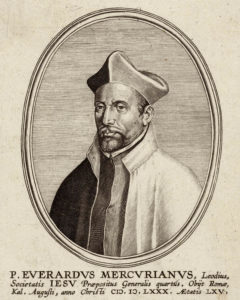Review: The Jesuit Order as a Synagogue of Jews — Part Two

Everard Mercurian (1514-1580)
“Being children of this world, pompous, cunning, fake, self-seeking, etc., it is certain that they fit religious life very badly and that it is impossible to maintain union with them. If those of this blood are made superiors, they employ almost all their government in external things: they promote genuine mortification and solid virtues very little, and seem to be merchants, seeking first seats and being called rabbis; they are hardly eager to seek perfection that is described in the parts 5 and 6 of the Constitutions; and readily admit others of the same blood who are very unworthy.”
Manuel Rodrigues, Jesuit curia in Rome.
The Racial Struggle for the Jesuit Order
The complaints of native Spanish members of the Society of Jesus, regarding the crypto-Jewish Jesuit elite, are remarkably uniform. Predominant among their concerns was the Jewish tendency towards monopoly, nepotism, arrogance, aggressive ambition, and an air of insincerity in the practice of Christianity. Of particular concern was the fact that the Spanish Jesuit Order was becoming an exclusive enclave of influential Jews that stretched out even into the heart of Rome.
The epigraph above, from Manuel Rodrigues, highlights all of these themes, some of which have been empirically demonstrated. For example, the body of research compiled by Maryks and other scholars, and discussed in Part 1, more than provides sufficient evidence in support of the accusation that crypto-Jews were “readily admitting others of the same blood.” Moreover, Benedetto Palmio, an Italian assistant to two native European Jesuit Superior Generals (Francisco de Borja and Everard Mercurian), complained of the “multitude and insolence of Spanish neophytes,” whom he described as a “pestilence (133).” Stressing that “where a New Christian was found, it was impossible to live in peace,” he added that “those who governed in Rome were almost all neophytes. … This sort of people and almost no other were being admitted in Spain (133).” King Phillip II of Spain had by the 1570s taken to describing the Jesuits as a “Synagogue of Hebrews.” (133)
The method of leadership employed by this crypto-Jewish elite was further described by Palmio as despotic. The crypto-Jewish elite in Rome was behaving “not as fathers but as masters (135).” Reflecting age-old Jewish ethnic networking, there were gross ethnic disparities in promotions to high office, with Palmio stressing that “the neophytes want to dominate everywhere and this is why the Society is agitated by the tempest of discords and acrimonies (138).” Conversos were “overly ambitious, insolent, Janus-faced, pretentious, despotic, astute, terrible, greedy for power, and infamous.” (142) Lorenzo Maggio, an Italian Jesuit curia in Rome, complained that “those from the circumcision subverted the entire house of the Society.” (117) Read more



 There are two pilgrimages which any ambitious British Conservative politician should undertake if he wants to seriously improve his chances of getting the top job. One is to Israel to be
There are two pilgrimages which any ambitious British Conservative politician should undertake if he wants to seriously improve his chances of getting the top job. One is to Israel to be 



